Dogmatic Theology (12 vols.)
Digital Logos Edition
Overview
In his mammoth 12-volume Dogmatic Theology, Joseph Pohle crafted one of the clearest and most succinct systems of Roman Catholic theology at the turn of the 20th century. As a member of the founding faculty of the Catholic University in America and a frequent contributor to the Catholic Encyclopedia, Pohle offered a unique—and important—Catholic perspective for theological scholarship in America. Pohle interacts with the vast corpus of theological literature from the history of the church, and uses both Scripture and tradition to make his case. Each volume is clearly outlined, making his argument easy to follow and his positions quick to identify.
Joseph Pohle’s Dogmatic Theology contains volumes on the doctrine of God, the doctrine of creation, Christology, and Trinitarian theology, along with his 4-volume work on the sacraments. Both Catholics and Protestants will find this massive work indispensable for its clear exposition of all loci of Christian theology. What’s more, with the power of your digital library, Pohle’s entire 12-volume Dogmatic Theology is fully searchable and easily accessible. Scripture references are linked to your favorite Bible translations and original language texts (if you own them), and important theological concepts are linked to dictionaries, encyclopedias, and a wealth of other resources in your digital library.
This title is included in the following collections
You can save when you purchase this product as part of a collection.
Verbum 5 Bronze Legacy Library
$89.99$89.99Verbum 5 Silver Legacy Library
$349.99$349.99Verbum 7 Gold Legacy Library
$849.99$849.99Verbum 6 Gold Legacy Library
$849.99$849.99
- $849.99
- $1,499.99
- $1,499.99
- $1,499.99
- $2,499.99
- $5,017.57$2,999.99
- $2,999.99
- $4,749.99
- $4,749.99
- $10,417.33$6,249.99
- $10,999.99$8,249.99
- $11,399.99
- $11,399.99
- $23,999.99$17,999.99

- Detailed footnotes and bibliographical material
- Each volume contains a detailed topical index
- All Scripture references linked to Greek texts and English translations in your digital library (if you own them)
- Links to other resources in your digital library, such as the Summa Theologica by Thomas Aquinas and Migne’s Patrologia Graeca.
- Title: Dogmatic Theology
- Publisher: B. Herder
- Author/Editor: Joseph Pohle
- Volumes: 12
- Pages: 3,670
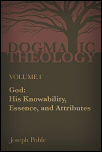
One of theology’s central tasks lies in answering the question: “Who is God, and how can human beings know God?”
This volume introduces readers to the doctrine of God and the process of discerning God’s nature and essence. Joseph Pohle searches Scripture and tradition to discern the nature and being of God, and our ability to know God. He describes God’s attributes—including absoluteness, immutability, eternality, and omnipresence—along with his unity and simplicity. God: His Knowability, Essence, and Attributes also contains chapters on God’s will possibility for individuals to discern it.
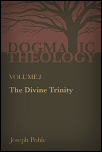
In this volume, Pohle traces references to the doctrine of the Trinity in the Old and New Testaments, and shows how the Trinity is foreshadowed in God’s covenant with Israel and in the fulfillment of the covenant in Christ. He then outlines a detailed doctrine of the Trinity, drawing from the entire Bible, the liturgies of the Early Church, and the subsequent development of doctrine. A discussion of various heresies in the church’s history also figures prominently.
The second half of this volume deals with the relationships between each person within the Trinity, along with the ways in which the Trinity is revealed—through reason, revelation, and the acceptance of mystery. Pohle asserts that evidence for the Trinity exists in both reason and revelation, but famously states: “Christians must first believe, then inquire.”
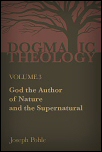
The first two volumes of Pohle’s Dogmatic Theology treat the doctrine of God as he is in himself. This volume, however, treats God in relationship to his creation.
Pohle defines creation as the most fundamental thing in theology. From a robust doctrine of creation, we discern the natural order, the incarnation, and the means of grace. In this volume, Pohle examines Scripture to uncover and explain God’s creative power, the relationship between the creation and the Trinity, as well as God’s continual act of creation. Pohle also devotes a section of this volume to theological anthropology, and discusses at length the immortality of the soul, the body/soul dichotomy, and God’s intention for human beings in relation to the rest of creation.
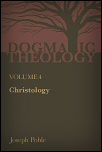
It has been said that all theology is Christology, and in this volume, Pohle affirms that adage.
Volume four of Dogmatic Theology defends the historicity of Christ’s existence at the height of historical criticism’s influence. He proves the humanity and divinity of Christ, and writes against recurring heresies in the church, such as Nestorianism and the monophysites. He also devotes a lengthy chapter to hypostatic union, perichoresis, and the communication of attributes.
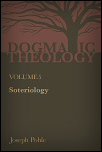
How, exactly, are we saved? In attempting to answer this question, Pohle joins a long line of thoughtful Christians who have reflected theologically on forgiveness and redemption. He writes on the purpose of studying Christ’s redemption, along with the necessity of redemption. He also defends the doctrine of predestination, and writes a lengthy chapter on the atonement—both of which merit reading in order to understand the contemporary controversy surrounding these doctrines. Pohle concludes with reflections on the offices of Christ—prophet, priest, and king.
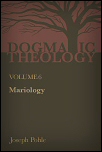
Although Mariology has been a flashpoint of contention between Catholics and Protestants, Mary plays an important role in doctrine, and should be studied for no other reason than she is the mother of Jesus.
In this short volume, Pohle exhibits a historical and theological mastery of the issue in his explanation of the immaculate conception, the complex relationship between Mary and original sin, and the perpetual virginity. He also draws from Scripture and tradition to relate the eternal person of Christ to the temporal nature of his conception and birth—thereby thrusting Mary into the theological spotlight. Protestants will find Pohle’s theological discourse especially useful for understanding an important, yet controversial dogma. This volume concludes with a lengthy appendix on the veneration of saints, relics, and images.
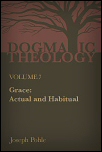
Pohle’s volume on grace explores the centrality of grace in Christian belief and practice. He writes at length on the relationship between unbelief and grace, as well as God’s will to save. A significant portion of this volume is devoted to free will, including the understanding of free will in the writings of Luther and Calvin, along with the Council of Trent. Pohle also deals with justification and sanctification—arguably the central and most controversial doctrines of the Reformation.
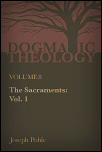
Salvation is not merely an internal transformation, but is manifested in the visible signs in the sacraments, which have their origin in the life of Christ—“outward and visible signs of an inward spiritual grace,” as Augustine famously defined them. The first of Pohle’s four volumes on the sacraments introduces readers, in detail, to sacramental theology. He uses Scripture to define the sacraments, their effects, and the ways they should be administered. The second half of this volume explains the sacraments of baptism and confirmation.
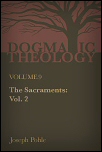
Pohle’s second volume on the sacraments explores the Eucharist. Pohle examines both Scripture and tradition to determine Christ’s presence in the sacrament, as well as the matter and form of the Eucharist. He also defends the necessity of the Eucharist and its position in the Mass. Of particular interest to Protestants, Pohle defines and explains transubstantiation.
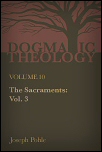
Volume 3 of Pohle’s work on the sacraments explores the role of the church in the forgiveness of sins, and the relationship between forgiveness and the sacrament of penance. Pohle defends the necessity of confession, and examines the history of the church to defend penance as a sacrament. He argues that penance constitutes a small part of the larger process of being reconciled to God. Although not all theologians agree on the sacrament of penance, all will agree that the church plays a vital role in conveying the assurance of salvation—thus making this work useful for theologians from all traditions.
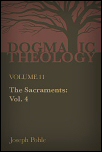
Pohle’s final volume on the sacraments covers extreme unction, holy orders, matrimony. He defends the necessity of each sacrament, defines the role of ministers, and shows how these sacraments—like all sacraments—perform a vital role in administering grace.
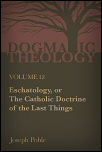
The end times have captivated the imaginations of Christians throughout the centuries. Significant portions of Scripture are devoted to Christ’s return, and countless theological works have been written on death, heaven and hell, the apocalypse, and other eschatological topics. This volume adds an important voice to the volumes of literature already written on the subject. Pohle writes lengthy chapters on death, heaven, hell, purgatory, along with the resurrection and the last judgment.
Joseph Pohle was born in 1852. He studied in Trier, Rome, and was ordained as a priest in 1878. He served as a professor in Baar, Switzerland from 1881 to 1883, as professor at St. Joseph’s College in Leeds, England from 1883 to 1886, and as professor of philosophy in Fulda from 1886 to 1889. In 1889, he moved to America to teach at the newly-founded Catholic University. Pohle returned to Europe in 1894, teaching at Münster and then Breslau, where he served as professor of dogma, and wrote his Dogmatic Theology. He was also a frequent contributor to the Catholic Encyclopedia. He died in 1922.
Reviews
2 ratings

Ralph A. Abernethy III
9/7/2017
Michael T. Fox
1/20/2017